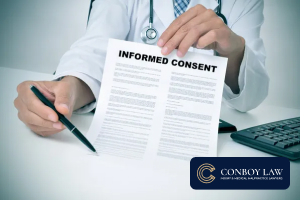
Dealing with a medical issue is tough, and it gets even more complicated if you think your healthcare provider made a mistake. Many patients have questions about medical malpractice and what they can do about it. At Conboy Law, our medical malpractice lawyers provide clear answers and strong guidance when you need it most.
When you’re facing medical challenges, the last thing you want is to worry about legal issues. But sometimes, you need to stand up for your rights. Medical malpractice claims are complex, but getting the basics down can help you feel more in control. Let’s walk through some common questions and give you the knowledge you need.
When it comes to medical malpractice, you might feel lost or confused about the next steps. Conboy Law has years of experience helping people like you. Some of the most common questions our clients ask us include:

A medical malpractice claim is a way for patients to get help if a healthcare provider makes a major mistake. To have a medical malpractice claim, you must show that a healthcare provider made a medical error that a competent professional would not have made under the same circumstances.
Not every medical problem leads to a malpractice claim. You have to prove that the medical error directly caused your injury or worsened your condition. Just because something went wrong doesn’t always mean there’s a claim. It’s about finding a clear link between the mistake and your injury.
Bad outcomes in medicine can happen even when everyone does everything right. So, a poor result doesn’t always mean you have a medical malpractice case. You need to show that the doctor or another healthcare provider made a mistake that led to your bad result. This is different from known risks that can occur with any treatment.
To know for sure, you have to dig into the details. What did the healthcare provider do? What should they have done instead? How did their actions hurt you specifically? These questions play a significant role in your case.

If that misdiagnosis caused you harm, then you can file a claim. If a competent doctor wouldn’t have made the same mistake under similar circumstances, it might be malpractice. It’s important to show that medical negligence or misdiagnosis led to treatment delays, no treatment, or wrong treatment.
Remember, not all misdiagnoses are malpractice. Sometimes, diseases present symptoms that can fool even the best doctors. But if a doctor didn’t do the right tests, ignored your symptoms, or failed to consult specialists, that’s when you might have a claim.
If you think you have a claim, it’s important to act fast. A few key steps to follow include:
Taking these steps helps protect your rights. Remember, medical malpractice laws are complicated. It’s essential to have a professional on your side to navigate the system.

Doctors often come to mind first, but they aren’t the only ones who can be responsible for medical malpractice. Nurses, healthcare facilities, and even pharmaceutical companies can be liable. It depends on who made the mistake and how that mistake affected you.
In a hospital setting, responsibility can also fall on the institution. If they didn’t have proper protocols, were understaffed, or didn’t make sure their staff was properly trained, the hospital might be at fault. Each case is different, and sometimes, more than one party is responsible.
Expert witnesses play a huge role in most medical malpractice cases. They help everyone understand how the defendant failed to uphold the standard of care. These witnesses are usually healthcare professionals with expertise in the same field as the defendant.
They look at all the evidence and explain it in court. Their testimony can make or break a case. They’ll tell you if a competent doctor would have done something different. They can also connect the dots between the mistake and your injury. We will find the best experts to support your case if a medical professional committed medical malpractice.

Informed consent is a key part of getting medical treatment. Before you go through with a procedure, your doctor should tell you about the risks, benefits, and alternatives. You should have enough information to make a decision about your own care. It’s your body, your health, and your choice.
Informed consent isn’t just about saying “yes” or “no.” It’s about understanding your decision. If a doctor doesn’t give you all the details, or if they downplay the risks, that’s a problem. It’s like signing a contract without reading it.
You can still sue for medical malpractice even if you signed a consent form. Signing a form doesn’t allow the healthcare provider to make careless mistakes. If the care you received fell below the acceptable standard and hurt you, that consent form doesn’t cancel your right to seek justice.
The consent form does show that you knew there were risks. The key is whether the doctor’s mistake was one of those known risks or something completely different. If it’s the latter, you might have a case.
If the consent form you signed is valid, you might still be able to recover damages. This is if you can prove that your injury came from a mistake that went beyond the risks you agreed to. The form might list complications that could happen, but not every possible mistake.
If something unusual or unexpected caused your injury, you might get damages. Think of the consent form as a list of what could happen, not a free pass for the doctor to harm you without consequence.
Medical malpractice lawsuits can take a while, often several years. They’re complex and need lots of investigation and expert opinions. Plus, both sides have to share information, and often, they’ll argue over the details. Then there’s the trial itself, which can be lengthy.
But the time it takes can be worth it if it means getting the compensation you need. Remember, a thorough case can lead to a better outcome for you. Patience is tough, but it’s a big part of this process.
It’s usually too late to file a lawsuit if it has expired. This law sets a deadline for how long you have to start legal action after you’re injured. It varies by state, so you need to check the laws where you live.
If you miss this deadline, you might lose your chance to get any compensation. That’s why it’s important to talk to a lawyer as soon as you think you might have a case. Time isn’t on your side in these situations.
The value of your medical malpractice case varies a lot. It depends on how badly you were hurt, how much money you lost because of it, and how it affected your life. Some people get compensation for medical bills, lost wages, and even pain and suffering.
The exact amount depends on the details of your case and the laws in your state. Some states have caps on certain damages, like pain and suffering.
You don’t legally have to have a lawyer to file a medical malpractice case, but it’s always better to hire one. These cases are complicated, and having a professional on your side can make a major difference. They know the laws, the system, and how to fight for you.
A strong medical malpractice lawyer will manage all the paperwork, find the right experts, and argue your case. They’ll be your guide through this tough journey, and they can make sure you recover the compensation you deserve.

If you’re trying to decide whether you have a medical malpractice claim, we’re here to help you. Conboy Law has the experience and determination to figure out if you have a case.
We will conduct an in-depth investigation and ensure your rights are protected. Contact us today to schedule a free consultation and speak with our team.
If you or a loved one has been injured, don’t hesitate to contact our injury attorneys today!
"*" indicates required fields


